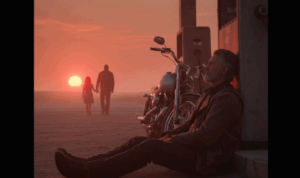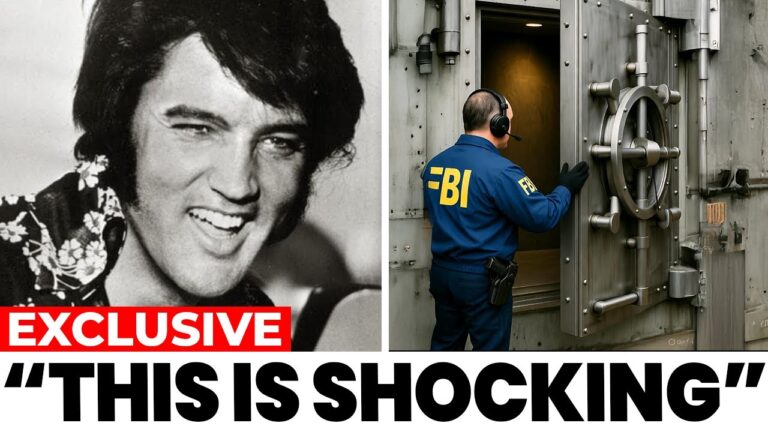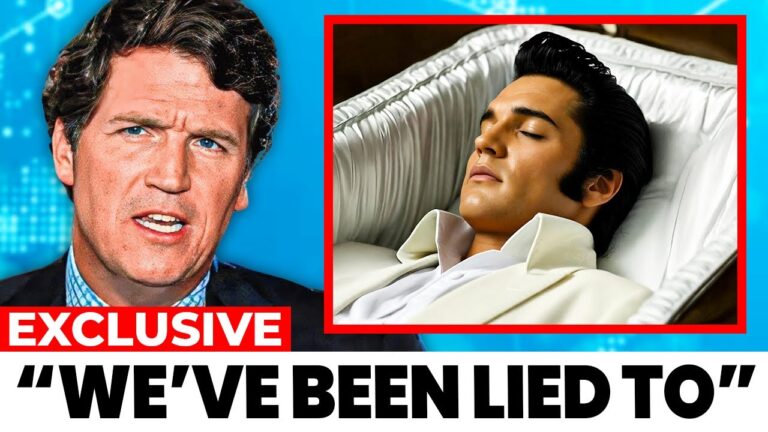The Nevada sun burned like fire over Highway 93. The asphalt shimmered as if it were melting steel, and the silence of the desert was so thick it swallowed every sound — except the dry rasp of wind scraping over the rusted sign of a lonely gas stop called Red Mesa.
Frankie “Hammer” Doyle, sixty-seven, pulled up on his battered silver Harley. Sweat rolled down his neck beneath the cracked leather jacket. His arms were inked, his beard white, his eyes the color of tarnished metal. He looked like a statue carved out of war and dust — the kind people crossed the street to avoid.
But Frankie wasn’t running from people. He was running from silence. He’d once had a son — a soldier who never made it home from Iraq. Since that day, Frankie had kept moving, believing that as long as the engine roared, the ghosts couldn’t catch him.
He stopped to refuel. The gas pump wheezed, the wind moaned through a broken flagpole. Then — faint, almost lost under the sound of the desert — came a cry.
He froze. Behind the gas station sat a silver pickup truck, doors shut, engine off. Inside, through the shimmering glass, a little girl — maybe eight years old — was pounding weakly on the window. Her face was flushed crimson. Her lips were turning blue.
“Hey! You okay in there?” Frankie shouted.
No answer. Only a cough — sharp, shallow, desperate.
He saw the inhaler in her hand, then the locked door. No adults in sight. “Damn it,” he muttered, then pulled the pocket knife from his belt. The blade hit the glass — once, twice — until it shattered. Heat burst out like the breath of an oven. He reached in, unlocked the door, and lifted her out.
The girl’s small body was trembling, her breath ragged. “Easy now,” he said. “You’re alright.”
She whispered through cracked lips, “Daddy’s coming… he’s working.”

Frankie turned toward the store — just as a man burst out, tall and broad-shouldered, carrying a wooden crate labeled “Live Animals – Handle With Care.” A logo for a wildlife transport company was stamped on the side.
When the man saw Frankie holding the child, his expression twisted. “What the hell are you doing to my daughter?!”
Before Frankie could explain, the man dropped the crate. A red bird — some kind of exotic parrot — exploded out of it and flew into the desert sky. The man lunged, furious. “You broke into my truck? You touch my kid?”
“Listen,” Frankie barked. “She was locked inside — she couldn’t breathe!”
“Bullshit!” the man shouted. “You think I’m stupid? You’re taking her!”
They collided, shoving each other in the dust. The girl started coughing violently again. “She’s having an attack!” Frankie yelled. “She needs her inhaler!”
But the man was too blinded by panic to hear. He shoved Frankie hard. From the window of the store, the old Mexican woman who ran the place grabbed the phone and called the cops.
Minutes later — sirens. Dust. Blue and red lights cutting through the heat.
The scene looked bad: an old biker covered in tattoos holding a child, a furious man shouting about kidnapping.
A young officer stepped out, gun raised. “Put the girl down! Step away!”
Frankie raised his hands. “She’s not hurt — she’s—”
“On your knees! Now!”
He hesitated, just long enough to see the girl’s chest rising and falling too fast. He dropped to his knees, hands behind his head.
The man — Mark Leary — grabbed his daughter, panic replacing his anger. “Emily! Emily, breathe!”
The officer approached Frankie cautiously, kicking the knife away. “You got any weapons on you?”
“Only my hands,” Frankie muttered. Then he saw the girl collapse, gasping.
“Her inhaler’s broken,” the other cop said.
Frankie shouted hoarsely, “There’s a spare in my jacket — do it now!”
The officer hesitated, hand on his gun.
“Do it, damn it! She’s dying!”
He reached into the jacket, found the inhaler, pressed it to the girl’s lips. One second. Two. Then she inhaled — a long, trembling breath. Her body relaxed. Color returned to her face.
Everyone froze. The only sound was the wind, and the low hum of the cruiser’s engine.
Mark Leary sank to the ground, shaking. “Oh God… thank you. Thank you.”
Frankie’s voice was calm but cold. “Don’t thank me. Just don’t let someone die next time because you were too scared of how they look.”
That evening, Frankie sat in a gray room at the county station. A detective flipped through his record. “Former Marine, huh?”
“Was,” Frankie answered.
Mark arrived with his daughter and a written statement. “It was my fault,” he said quietly. “I left her in the truck while unloading. He saved her.”
The officer nodded, unlocked the cuffs. “You’re free to go, Mr. Doyle. We’re sorry — from a distance, well… you looked—”
“Dangerous?” Frankie interrupted, a bitter half-smile on his lips. “People usually fear tattoos more than neglect.”
He put his jacket back on and stepped outside.
The girl ran after him, wrapping her arms around his leg. “Thank you, mister. You look like my dad… before.”
Frankie froze. “Before?”
Mark looked down. “I’m her foster father. Her real dad passed away last year.”
Frankie’s face softened. He knelt down and brushed a strand of hair from the girl’s forehead. “Yeah,” he said softly. “I know that feeling.”
The sun set over Red Mesa, turning the sky into blood and copper. Frankie sat beside his Harley, lighting a cigarette, watching the desert breathe. Mark joined him, handed him a cold bottle of water.
“You still ride long distance?” Mark asked.
“Yeah,” Frankie said. “Nowhere to stop anymore.”
“Then why did you stop today?”
Frankie exhaled smoke, eyes fixed on the horizon. “Because I heard someone crying. And once… I didn’t hear it soon enough.”
Mark nodded, silent. After a pause, he said, “Up north, there’s a wildlife station — they could use a man who knows how to fix things. Machines. People. Doesn’t matter.”
Frankie chuckled. “I just fix engines.”
“Every engine needs someone patient enough to listen,” Mark said.
The next morning, Frankie tightened the straps on his saddlebag. Before kicking up the stand, he glanced back at the rusty sign of Red Mesa Stop. Someone had painted over it during the night in white letters:
“Don’t judge the rider — judge the road he takes.”
He smiled, started the bike. The Harley roared to life, the sound echoing across the dunes. Dust swirled behind him as he rode off toward the horizon.
In the mirror, the station grew smaller, then disappeared completely. The desert swallowed it whole, leaving only wind — and, somewhere deep in that wind, a voice, faint but clear:
“He wasn’t hurting me. He was helping me breathe.”
Sometimes the people who look the scariest are the only ones brave enough to act.
Between the heat of the desert and the coldness of judgment, kindness doesn’t need to look pretty — it just needs to be real.





